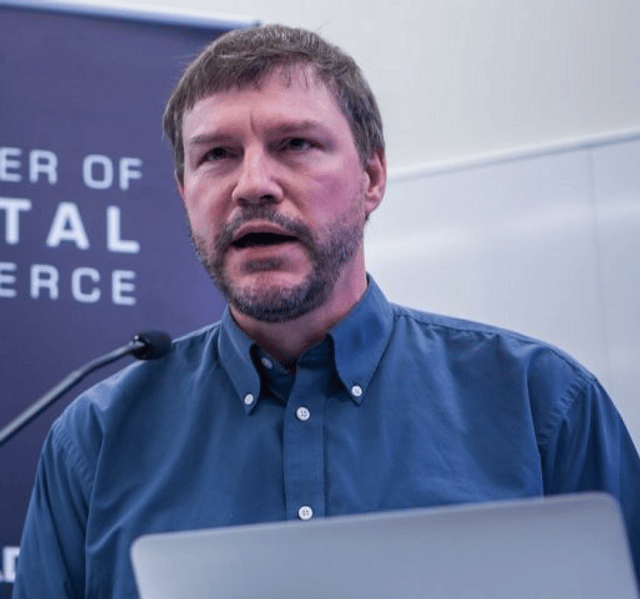Nick Szabo

Nick Szabo
Nick Szabo is a computer scientist, legal scholar and cryptographer known for his research in digital contracts and digital currency. He invented smart contracts and was an early experimenter in digital currency, founding bit gold. [24]
Education
He graduated from the University of Washington in 1989 with a degree in computer science. He also holds a law degree from George Washington University Law School. [2]
Smart Contracts
The phrase and concept of "smart contracts" was developed by Szabo with the goal of bringing what he calls the "highly evolved" practices of contract law and practice to the design of electronic commerce protocols between strangers on the Internet. [3] [4] Smart contracts are a major feature of cryptocurrencies [5] [6] and the E programming language. [7]
His influential paper was published in issue #16 of a journal called Extropy.
The paper was titled: “Smart Contracts: Building Blocks for Digital Markets”.
Nick Szabo is so deeply ingrained in the modern digital currency landscape that 1/1000000000000th of an Ether is called a "szabo".[27]
Bit gold
In Szabo’s bit gold scheme, a participant would dedicate computer power to solving cryptographic puzzles. In a bit gold network, solved puzzles would be sent to the Byzantine fault-tolerant public registry and assigned to the public key of the solver. Each solution would become part of the next challenge, creating a growing chain of new property. This aspect of the system provided a way for the network to verify and time-stamp new coins, because unless a majority of the parties agreed to accept new solutions, they couldn’t start on the next puzzle. [13] [14]
When attempting to design transactions with a digital coin, you run into the “double-spending problem.”
Once data have been created, reproducing them is a simple matter of copying and pasting.
Most digital currencies solve the problem by relinquishing some control to a central authority, which keeps track of each account’s balance.
This was an unacceptable solution for Szabo.
“I was trying to mimic as closely as possible in cyberspace the security and trust characteristics of gold, and chief among those is that it doesn’t depend on a trusted central authority,” he said.
Bitcoin speculation
In 2008, a mysterious figure who wrote under the name Satoshi Nakamoto released a proposal for bitcoin. Nakamoto’s true identity remained a secret, which led to speculation about a long list of people suspected to be Nakamoto. Although Szabo has repeatedly denied it, people have speculated that he is Nakamoto. [2] [2]
Research by financial author Dominic Frisby provides circumstantial evidence but, as he admits, no proof that Satoshi is Szabo. [2] Speaking on RT's Keiser Report , he said "I've concluded there is only one person in the whole world that has the sheer breadth but also the specificity of knowledge and it is this chap...". [2] In a July 2014 email to Frisby, Szabo said: 'Thanks for letting me know. I'm afraid you got it wrong doxing me as Satoshi, but I'm used to it.'[2]
Nathaniel Popper wrote in The New York Times that "the most convincing evidence pointed to a reclusive American man of Hungarian descent named Nick Szabo." In 2008, prior to the release of bitcoin, Szabo wrote a comment on his blog about the intent of creating a live version of his hypothetical currency. Nathaniel Popper later tweeted that he did not believe Szabo was Satoshi in 2018. [3] [23]
In 2015, the subsequent blockchain Ethereum named a subunit of the Ethereum value token the "Szabo".
Cypherpunks
Nick Szabo was an early member of Cypherpunks and in 1993 he described the group: [25]
"Some of us are libertarians who want government out of our lives, others are liberals fighting the NSA, others find it great fun to ding people in power with cool hacks, and others are in it for the variety of opportunities crypto-anarchy opens for making "filthy lucre"."
One of the Cypherpunk movement founders, David Chaum, was also the founder of an early fiat alternative called DigiCash. Szabo served as a consultant at DigiCash for half a year. The company later went bankrupt and Szabo noted the need for decentralization early on. DigiCash developed the Ecash algorithm.




